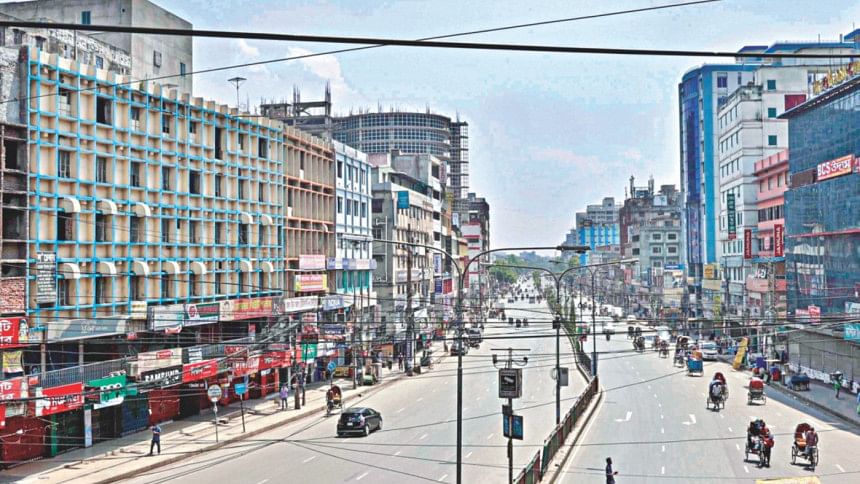How will the Covid-19 stimulus package be implemented?

As the impact of the coronavirus outbreak on Bangladesh economy is becoming apparent in many ways, Prime Minister Sheikh Hasina announced a second stimulus package for the affected sectors on April 5, 2020. These packages are for the immediate, short and long terms that aim to increase public expenditure, widen social safety net coverage and increase monetary supply. Earlier, on March 25, 2020, the government declared the first stimulus package amounting to Tk 5,000 crore for the export-oriented sectors.
Now the second package covers four areas and amounts to Tk 67,750 crore to overcome the economic losses caused by the coronavirus situation. Thus, the total size of the stimulus packages stands at Tk 72,750 crore, which is about 2.5 percent of Bangladesh's gross domestic product (GDP). This support is deemed to help both local and export-oriented sectors which are facing the heat of Covid-19.
In the new package, Tk 30,000 crore is set aside for big industries and the service sector which will be distributed by commercial banks as working capital loan at 9 percent interest rate. Here, the government will provide 4.5 percent as interest subsidy. Small and medium enterprises (SMEs), including the cottage industries, will receive Tk 20,000 crore as working capital loan at 9 percent interest rate, and the government will give 5 percent interest subsidy. An amount of Tk 12,750 crore has been allocated under the Export Development Fund (EDF) of Bangladesh Bank to facilitate raw materials imports under back-to-back Letter of Credit. The interest rate here has been reduced to 2 percent from 2.73 percent. The fourth component is the allocation of Tk 5,000 crore to facilitate the "Pre-shipment Credit Refinance Scheme" at 7 percent interest rate.
The government has also committed to widen the coverage of the existing social safety net to address the basic needs of people living below the poverty line. These include workers in the informal sector, the daily labourers, old people and destitute women. They will be supported by way of cash transfers, free food and rice at Tk 10 per kilogramme through the open market sale operation. Free housing has been promised to the homeless people. There is no clear indication about the amount of resources allocated for these activities. If these people are to survive throughout the corona period and beyond, there will be a huge requirement for that. Therefore, not only the allocation is required right now, but the upcoming budget for FY 2021 will have to make room for their requirements.
The stimulus package is a timely and much-needed measure. The questions that are echoed all around now are: how this money will be mobilised, and how it will be utilised.
Apparently, it seems that the major responsibility will be on the commercial banks. The banks have to generate the funds to provide working capital loan for business, trade and services. In this respect, a number of issues can be raised.
First, one of the important features of Bangladesh's stimulus package is that the lion's share of the package—Tk 67,750 crore—is repayable loan. In other words, this is a liquidity support. Except for the support under EDF of the central bank, the commercial banks will be responsible for the selection of their customers, and thus for absorbing all types of risks attached to the loan, such as management risk, sectoral risk and market risk. The banks will also have to ensure that the loan is paid back to them in due course.
Given the current health of the banking sector, whether it is in a position to perform this huge responsibility is a natural question. The banking sector is now overburdened with huge non-performing loans (NPLs), liquidity shortage, low net profitability, lack of skilled human resources, poor risk management preparation and inadequate technological skills.
Several banks have lost their reputation due to bad loans and poor management. People have turned away from them and do not want to keep their hard-earned money in these banks. Particularly, the new banks and several non-banking financial institutions are suffering from a serious management crisis that led to loss of confidence of the depositors.
In the current fiscal year, the government has imposed restrictions on further sales of the savings certificate as it was creating a fiscal burden for the government. As a result, bank deposit has increased by about 10 percent in the current fiscal year. However, those deposits are kept in the good private banks and in the state-owned banks. Therefore, not all banks are equally capable of providing loans to support the Covid-19 affected businesses.
Second, if the Covid-19 loans become bad loans, the banking sector will run into further trouble. It has been mentioned that borrowers will be selected by the banks based on bank-client relationship. Unfortunately, this understanding did not bring any good for the banking sector so far. Much of the NPLs in the banking sector is due to the habitual defaulters who have been given leeway through various supports by the policymakers. Given the historical experience of loan default, one cannot but be apprehensive of the misuse of the new opportunities announced for the corona-affected businesses. The wilful defaulters are mostly powerful and politically connected people. Banks have had always difficulties both in case of refusing loans to them and in recovering the loans from them. Thus, banks should be hundred percent compliant in disbursing these loans during such a critical time. The central bank has a critical overseeing role to play here.
This is more so because the full responsibility of fund distribution and management will be on the commercial banks. No other organisations will be there for them. Even any irregularity with regard to the distribution of EDF fund will not be the responsibility of the central bank. The Ministry of Finance will provide export support. In case of bank loans, the ministry will pay the interest subsidy on loans which are projected to be Tk 3,000 crore.
Third, how the money will be generated is another issue. As the coronavirus continues to affect the economy, the liquidity crunch will deteriorate further since economic activities will shrink. Bangladesh Bank has undertaken quantitative easing by reducing policy rates. Towards this, the Cash Reserve Ratio (CRR) has been reduced by 0.5 percentage point. This will generate an additional Tk 6,200 crore. If needed, Bangladesh Bank may have to reduce the CRR further and also reduce other rates such as the Statutory Liquidity Ratio (SLR) given the demand for liquidity during the Covid-19 crisis.
Fourth, the transparency and accountability of this stimulus package will be of paramount importance. Who will get the support, on what basis the demand of the applicants will be assessed, and whether there will be non-interference from the powerful groups are issues that are attached to the distribution of the incentive package. Of course, the prime minister herself warned against misappropriation and mismanagement of the stimulus package. One only hopes this message reaches the people at the ground level—and for once at least, the opportunists keep themselves away from grabbing a share from this humanitarian support.
Finally, the government should also explore options for support from the international development agencies and donors. International Monetary Fund, World Bank, Asian Development Bank, Asian Infrastructure Investment Bank, Islamic Development Bank and other agencies have enhanced their support packages during this crisis moment. Bangladesh will have to move fast since there are several countries in line to receive their support to tackle the impact of Covid-19 crisis.
Dr Fahmida Khatun is Executive Director at the Centre for Policy Dialogue.

 For all latest news, follow The Daily Star's Google News channel.
For all latest news, follow The Daily Star's Google News channel. 



Comments